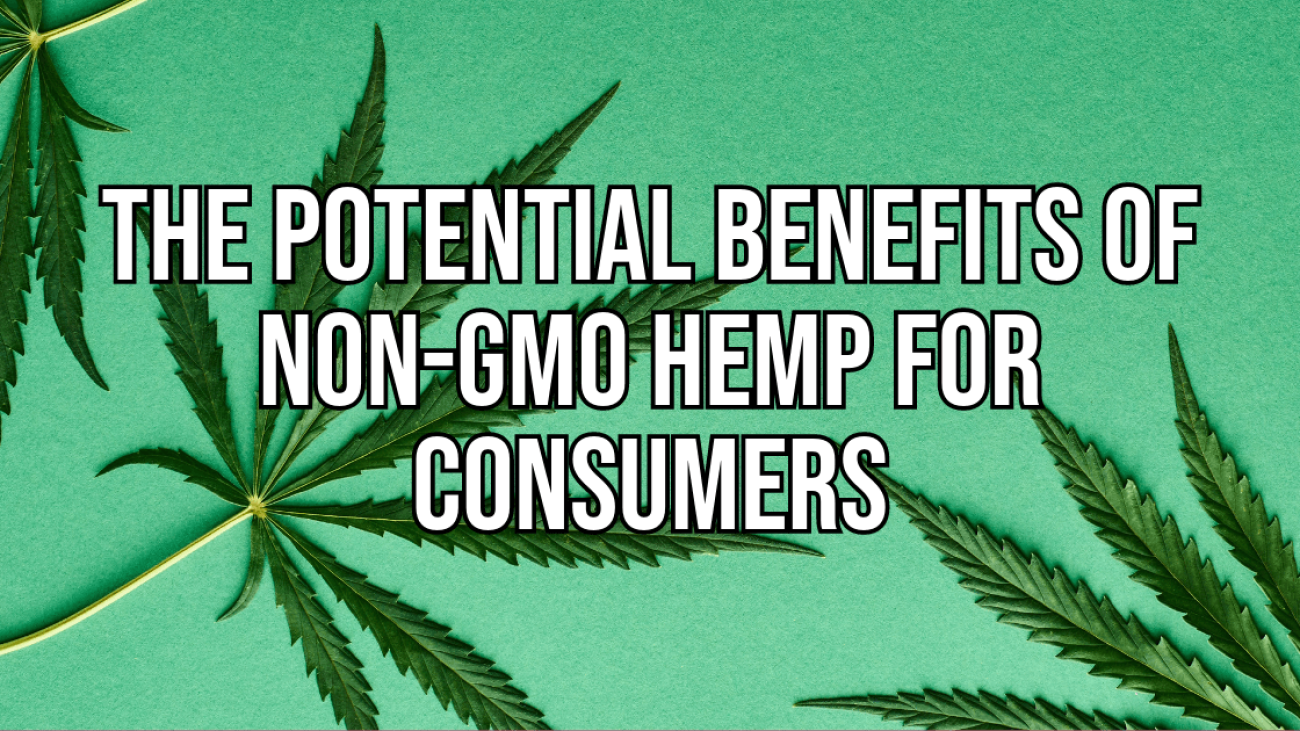Introduction
Hemp, a versatile and ancient plant, has made a remarkable comeback in recent years. As awareness of its potential benefits continues to grow, consumers are seeking products made from non-genetically modified organisms (GMOs) for various reasons, including health, sustainability, and ethical concerns. In this article, we will explore the potential benefits of non-GMO hemp for consumers and shed light on why choosing non-GMO hemp products may be a wise choice. So let’s dive into The Potential Benefits of Non-GMO Hemp for Consumers.
The Nature of Hemp
Hemp, scientifically known as Cannabis sativa, is one of the oldest cultivated crops on Earth, with a history dating back thousands of years. Unlike its cousin, marijuana, hemp is non-psychoactive due to its low tetrahydrocannabinol (THC) content. Hemp has an astonishing array of uses, from textiles and construction materials to biofuels and health supplements.
Understanding GMOs
To appreciate the benefits of non-GMO hemp, it’s essential to understand what GMOs are. Genetically modified organisms are living organisms whose genetic material has been altered in a way that does not occur naturally through mating or natural recombination. This process involves inserting foreign genes from other species to enhance desired traits.
GMOs in agriculture are engineered for traits such as resistance to pests, herbicides, or increased yield. While proponents argue that GMOs have helped increase crop yields and reduce pesticide use, there are growing concerns about their potential impact on human health, the environment, and biodiversity.
Health Benefits of Non-GMO Hemp
a. Nutrient Density
Non-GMO hemp is a nutritional powerhouse. It contains a rich array of vitamins, minerals, and essential fatty acids. Hemp seeds, in particular, are packed with protein, fiber, omega-3 fatty acids, and other vital nutrients. By choosing non-GMO hemp products, consumers can enjoy these nutritional benefits without potential health risks associated with GMOs.
b. Hemp Oil for Health
Hemp oil, extracted from the seeds of the hemp plant, is celebrated for its health-promoting properties. It is an excellent source of omega-3 and omega-6 fatty acids, which are crucial for maintaining heart health, reducing inflammation, and promoting brain function. Non-GMO hemp oil is free from genetically modified alterations, ensuring purity and safety.
c. Potential Therapeutic Benefits
CBD (cannabidiol), a compound found in hemp, has gained significant attention for its potential therapeutic benefits along with Delta 9 THC. Non-GMO hemp-derived CBD and Delta 9 THC products offer consumers a natural and non-GMO alternative to pharmaceuticals for managing various conditions, including pain, anxiety, and epilepsy. The absence of genetic modifications ensures that consumers receive the purest form of this beneficial compound.
Environmental Benefits of Non-GMO Hemp
a. Biodiversity Conservation
One of the primary concerns regarding GMO crops is their potential impact on biodiversity. Non-GMO hemp, cultivated naturally without genetic modifications, supports biodiversity by providing habitat and food sources for various insects and wildlife. This promotes a healthier ecosystem, which is crucial for sustainable agriculture.
b. Reduced Chemical Use
Non-GMO hemp cultivation typically relies less on synthetic chemicals such as pesticides and herbicides. This approach helps reduce the environmental footprint of hemp farming, safeguarding soil quality, and preventing contamination of nearby ecosystems. Choosing non-GMO hemp products encourages environmentally responsible agricultural practices.
c. Sustainable Agriculture
Non-GMO hemp aligns with the principles of sustainable agriculture. Sustainable farming methods prioritize long-term ecological balance, economic viability, and social responsibility. By supporting non-GMO hemp, consumers contribute to a more sustainable and environmentally friendly agricultural system.
Ethical Considerations
a. Farming Practices
Consumers who opt for non-GMO hemp often do so out of ethical concerns. These individuals believe in supporting agricultural practices that prioritize natural processes over genetic engineering. By choosing non-GMO hemp, consumers encourage farming methods that are in harmony with nature.
b. Transparency and Labeling
Transparency is a crucial factor in ethical consumerism. Non-GMO hemp products are typically labeled as such, providing consumers with clear information about the origin and quality of the product. This transparency empowers consumers to make informed choices that align with their values.
Market Demand and Consumer Choice
The demand for non-GMO products has been steadily increasing in recent years. As consumers become more conscious of the potential health and environmental risks associated with GMOs, they actively seek out non-GMO options. Non-GMO hemp products cater to this growing market demand, offering consumers a choice that aligns with their preferences and values.
Potential Challenges and Concerns
a. Price Differential
One potential challenge with non-GMO hemp products is that they can be slightly more expensive than their GMO counterparts. The higher costs are often attributed to the additional effort and resources required for non-GMO farming practices, such as manual pest control. However, many consumers are willing to pay a premium for products they perceive as healthier and more ethical.
b. Supply Chain Issues
Ensuring a consistent supply of non-GMO hemp can be challenging, as GMO crops can inadvertently crossbreed with non-GMO varieties. This requires strict adherence to segregation and testing processes to maintain the integrity of non-GMO hemp products.
c. Limited Research
While there is substantial research on hemp and its potential benefits, the specific advantages of non-GMO hemp over GMO hemp are not extensively documented. More research is needed to quantify the differences and advantages of non-GMO hemp fully.
Conclusion
Non-GMO hemp offers consumers a host of potential benefits, including enhanced health and well-being, reduced environmental impact, and alignment with ethical values. As consumers become more discerning and conscious of their choices, non-GMO hemp products provide a viable and desirable alternative to genetically modified counterparts.
By opting for non-GMO hemp, consumers can support sustainable agriculture, promote biodiversity conservation, and contribute to a healthier planet. Moreover, they can enjoy the nutritional and therapeutic benefits of hemp in its most natural and unaltered form. As the demand for non-GMO products continues to grow, the market for non-GMO hemp is poised for expansion, giving consumers even more opportunities to make choices that reflect their values and priorities.


